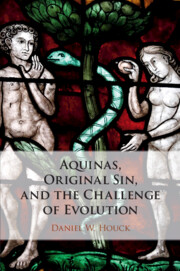Book contents
- Aquinas, Original Sin, and the Challenge of Evolution
- Aquinas, Original Sin, and the Challenge of Evolution
- Copyright page
- Dedication
- Contents
- Acknowledgments
- Introduction
- 1 Augustine and the Long Twelfth Century
- 2 Aquinas on Original Justice
- 3 Aquinas on the Effects of Original Sin
- 4 Aquinas on Original Guilt
- 5 Original Sin and Some Modern Theologians
- 6 Original Sin and the Challenge of Evolution
- 7 Original Sin
- 8 A Response to Some Objections
- Conclusion
- Select Bibliography
- Index
6 - Original Sin and the Challenge of Evolution
Published online by Cambridge University Press: 22 February 2020
- Aquinas, Original Sin, and the Challenge of Evolution
- Aquinas, Original Sin, and the Challenge of Evolution
- Copyright page
- Dedication
- Contents
- Acknowledgments
- Introduction
- 1 Augustine and the Long Twelfth Century
- 2 Aquinas on Original Justice
- 3 Aquinas on the Effects of Original Sin
- 4 Aquinas on Original Guilt
- 5 Original Sin and Some Modern Theologians
- 6 Original Sin and the Challenge of Evolution
- 7 Original Sin
- 8 A Response to Some Objections
- Conclusion
- Select Bibliography
- Index
Summary
Chapter 6 unpacks salient hypotheses in contemporary evolutionary theory that challenge traditional views of the Fall and original sin. The first challenge comes from the gradual nature of evolutionary change. On the modern synthesis of Mendel’s account of particulate inheritance with Darwin’s account of natural selection, evolutionary change happens gradually. It is hard to see how a single volition could have corrupted human nature. (This seems to be true even on the “extended evolutionary synthesis.”) The second challenge, or rather set of challenges, stems from the legacy of our evolutionary history. It appears that at least some human beings were disposed to sinful forms of behavior (e.g., aggressive violence), and yet at the same time we have evolved dispositions to altruistic cooperation. This causes problem for the traditional Augustinian account of both pre- and postlapsarian human nature: human desires seem not to have been perfectly ordered before the Fall, and after the Fall it seems that we aren’t entirely selfish. The third challenge stems from the widely supported hypothesis that the human population never dipped below 6,000 individuals. Either some people were created in sin or far more people were created without sin than traditionally assumed.
Keywords
- Type
- Chapter
- Information
- Aquinas, Original Sin, and the Challenge of Evolution , pp. 179 - 199Publisher: Cambridge University PressPrint publication year: 2020

